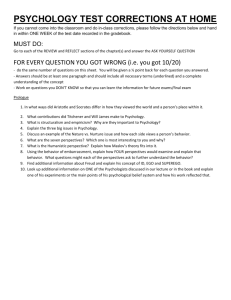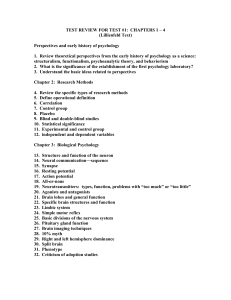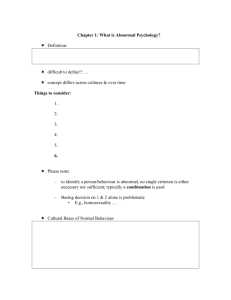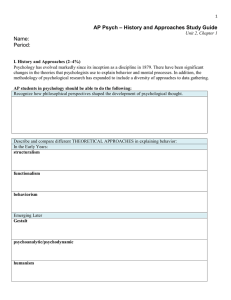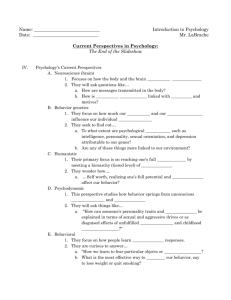2 Historical Perspectives
advertisement
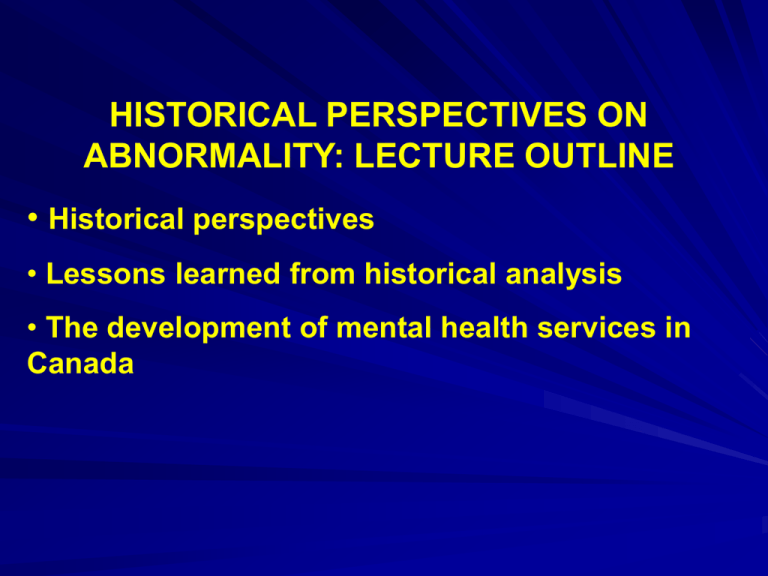
HISTORICAL PERSPECTIVES ON ABNORMALITY: LECTURE OUTLINE • Historical perspectives • Lessons learned from historical analysis • The development of mental health services in Canada HISTORICAL PERSPECTIVES • Ancient societies – focus on supernatural causes, harsh treatments • Greek and Roman – focus on natural causes, humane treatment • Europe in the middle ages – mostly focused on supernatural causes, witchcraft, demonology, Malleus Maleficarum, development of asylums in the 1500s, mostly harsh treatments HISTORICAL PERSPECTIVES Moral treatment (1st mental health revolution) – 1790s, Pinel, Tuke, Rush, focus on natural causes and humane treatment HISTORICAL PERSPECTIVES Dorthea Dix and the rise of the medical model – mid to late 1800s, Kraeplin, advances in medicine, germ theory, Social Darwinism, institutionalization HISTORICAL PERSPECTIVES • Mental hygiene movement – early 1900s, Meyer, Beers, James, Hincks, focus on humane treatment • Psychoanalysis (2nd mental health revolution) – Charcot, Breuer, Freud, focus on psychological factors and treatments • Community mental health (3rd mental health revolution) – beginning in the 1960s, deinstitutionalization, development of community-based programs LESSONS LEARNED FROM HISTORICAL ANALYSIS • The early history of psychopathology reveals a struggle between supernatural and naturalistic explanations and between harsh and humane treatments • After the middle ages, naturalistic approaches based on scientific methods became dominant LESSONS LEARNED FROM HISTORICAL ANALYSIS • Whereas religious healers formerly provided “treatment,” this has become the domain of mental health professionals in the 20th century • Psychiatry and medicine have come to dominate mental health services, but clinical psychology has emerged in the past 30 years LESSONS LEARNED FROM HISTORICAL ANALYSIS • There has been a recurring pattern of expose and reform with regard to inhumane conditions for people with mental illness • Views of etiology and treatment vary with social conditions • There is a widening scope of experiences that are considered to be mental health problems THE DEVELOPMENT OF MENTAL HEALTH SERVICES IN CANADA • Late 1600s – asylums in Quebec • Mid to late 1800s – Dorthea Dix and the rise of the medical model and asylums in eastern Canada • Early 1900s – mental hygiene movement – Hincks, CMHA, growth of psychoanalysis • 1940s – mental hospitals, medical superintendents, psychiatry THE DEVELOPMENT OF MENTAL HEALTH SERVICES IN CANADA • 1950s and 1960s – institutions, abuses, somatic “treatments”; Saskatchewan plan; Tyhurst (1963) report; shift to general hospitals • 1970s and 1980s – emergence of clinical psychology training programs; beginning of community mental health programs THE DEVELOPMENT OF MENTAL HEALTH SERVICES IN CANADA • 1990s to today – establishment of clinical psychology across Canada (including 1st Canadian textbook on abnormal psychology); both hospital and community mental health services subjected to government cutbacks in funding; in 2000, funding for phases I and II of mental health homelessness initiative in Ontario SUMMARY • Abnormality and mental illness are problematic concepts because of values and social context • Martin Luther King Jr. proposed that psychology should form a “centre for creative maladjustment” SUMMARY • Remember that mental illness is not something absolute and unchangeable, but a concept that is constructed in a social context • Stigma and discrimination towards people experiencing mental health problems have existed throughout history • Need to dream of a better world for people with mental illness
